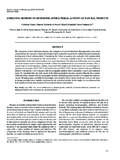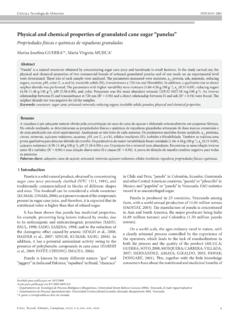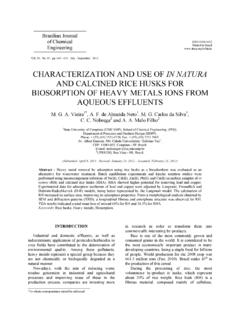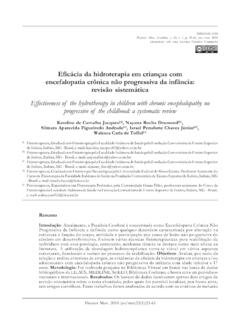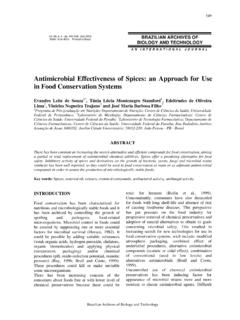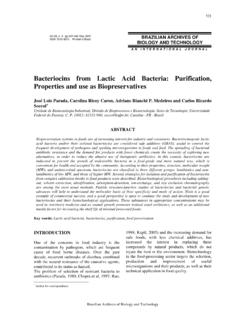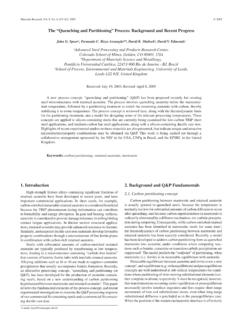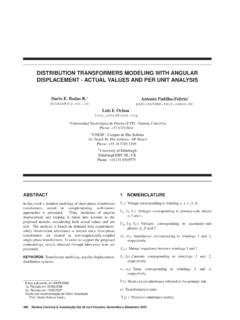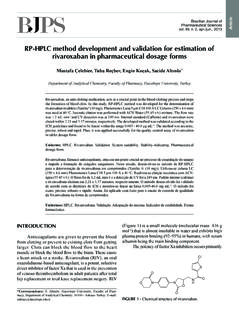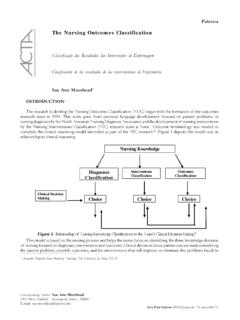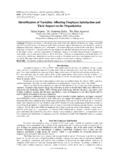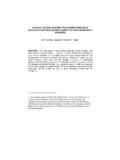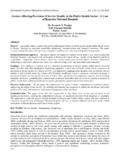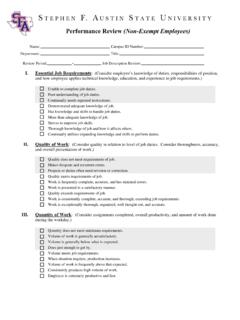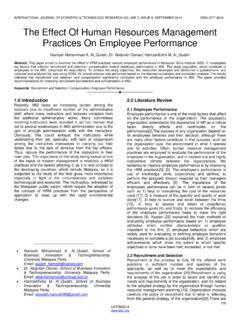Transcription of What factors of satisfaction and motivation are affecting ...
1 Rap rio de Janeiro 45(1):33-44, 2011issn0034-7612 What factors of satisfaction and motivation are affecting the development of the academic career in Portuguese higher education institutions?*Maria de Lourdes Machado-Taylor**virg lio Meira Soares**Jos Brites ferreira**od lia Maria rocha Gouveia**Su m m a ry: 1. Introduction; 2. Theorethical background: the state of the art; 3. Brief overview of the academic profession in the Portuguese higher education institutions; 4. Instruments and sampling; 5. Final m r i o: I. Introdu o; 2. A base te rica: o n vel mais elevado; 3. Breve panorama da profiss o acad mica nas institui es portuguesas de ensino superior; 4.
2 Instru-mentos e amostragem; 5. Considera es y w o r dS: higher education; satisfaction ; motivation ; academic l av r aS-c h av e: ensino superior; satisfa o; motiva o; acad important constituent group and a key resource of higher education institutions (HEIs) is the faculty or academic staff. The centrality of the faculty role makes it a * Article received in Out. 2010 and accepted in Dec. 2010.** Doutoramento em Ci ncias Empresariais. Investigadora do Centro de Investiga o de Pol ticas do Ensino Superior (Cipes) e Instituto Polit cnico de Bragan a (IPB). Endere o: Rua 1o de De-zembro, 399 4450-227, Matosinhos, Portugal. E-mail: Doutoramento em engenharia qu mica (qu mica termodin mica).
3 Professor e Investigador da Universidade de Lisboa (UL) e do Cipes. Endere o: Alameda da Universidade, 1600, Lisboa, Portugl. E-mail: Doutoramento em ci ncias da educa o. Professor e investigador do Instituto Polit cnico de Leiria (IPL) e do Cipes. Endere o: Rua 1o de Dezembro, 399 4450-227 Matosinhos, Portugal. E-mail: Licenciatura em sociologia. Assistente de Investiga o do Cipes. Endere o: Rua 1o de De-zembro, 399 4450-227 Matosinhos, : rio de Janeiro 45(1):33-44, 201134 Maria de LourdeS Machado-TayLor eT sculptor of institutional culture and has implications for the quality of the institution and therefore has a major role in achieving the objectives of the institu-tion.
4 Demand for academic staff in higher education has been increasing and may be expected to continue to increase. Moreover the performance of academic staff as teachers and researchers determines much of the student satisfaction and has an impact on student learning. There are many factors that serve to undermine the commitment of academics to their institutions and careers. Job satisfaction is important in revitalizing staff motivation and in keeping their enthusiasm alive. Well motivated academic staff can, with appropriate support, build a national and international reputation for themselves and the institution in the professional ar-eas, in research and in publishing.
5 This paper aims to identify the issues and their impacts on academic staff job satisfaction and motivation within Portuguese higher education institutions reporting an ongoing study financed by the European Union through the Portuguese Foundation for Science and fatores de satisfa o e motiva o est o afetando o desenvolvimento da carreira acad mica em institui es de ensino superior em Portugal?Os docentes ou pessoal acad mico s o um importante grupo constituinte e recurso-chave das institui es de ensino superior (IES). A centralidade do papel do docente faz dele um escultor fundamental da cultura institucional, com implica es na qualidade da institui o e, consequentemente, na prossecu o dos objetivos da institui o.
6 A procura de docentes no ensino superior tem vindo a aumentar e expect vel que continue a crescer. Al m disso, o desempenho do pessoal docente (grupo no qual se incluem docentes e investigadores) determina em grande medida a satisfa o dos estudantes e tem impacto na sua aprendizagem. Existe um vasto conjunto de fatores que contribuem para minar o compromisso do pessoal docente com suas institui es e carreiras. A satisfa o no trabalho importante na revitaliza o da motiva o do pessoal e em manter vivo seu entusiasmo. Pessoal docente bem motivado pode, com o apoio adequado, construir uma reputa o nacional e internacional para si e para a institui o nas reas profissionais, na investiga o e na publica o.
7 Este artigo visa identificar t picos com impacto na satisfa o profissional e motiva o do pessoal docente das institui es de ensino superior em Portugal, descrevendo um estudo em curso financiado pela Uni o Europeia, atrav s da Funda o para a Ci ncia e a IntroductionToday s higher education institution (HEI) is an extremely complex social or-ganization. One must examine a multitude of factors and their numerous in-teractions in order to even approach an understanding of its functions. One cannot minimize the confounding effects the human factor introduces to so-35 WhaT factors of SaTi SfacTion and motivation are affecting The deveLopMenT of The acadeMic career in porTuGueSe hiGher educaTion inSTiTuTionS?
8 Rap rio de Janeiro 45(1):33-44, 2011cial organizations. Here, we will pay attention to a particular group the academic staff as a key resource within higher education institutions and his major role in achieving the objectives of the for academic staff in higher education has been increasing and may be expected to continue to increase. The centrality of the faculty role makes it a primary sculptor of institutional culture. According to Altbach and Chait (2001, cited in Ssesanga and Garrett, 2005), the work of academics is influenced by global trends such as accountability, massification, deteriorating financial support and managerial controls.
9 So, we assist to the rapid chan-ge of the academic workplace and to the necessity to manage the tensions within the academic profession. Moreover, for Altbach (2003), with the era of mass higher education the conditions of academic work have deteriorated performance of academic staff as teachers and researchers deter-mines much of the student satisfaction and has an impact on student lear-ning and thus the contribution of the higher education institutions (HEIs) to society. Thus satisfaction and motivation of the academic staff assumes importance. Oversimplified and na ve explanations of job satisfaction abound in all sectors of the workforce.
10 Most typical is the mistaken belief that pay incentives alone will create effective levels of motivation and thus, overall job satisfaction . Previous research indicates that dissatisfaction stems from inadequate and non-competitive salaries and further lack of job satisfaction due to non-monetary reasons. There are intrinsic variables related to personal growth and development, and extrinsic factors associated with security in the work environment. There is also ample and somewhat obvious evidence that job satisfaction is related to employee Theorethical background: the state of the artJob satisfaction is multi-dimensional with both intrinsic and extrinsic quali-ties.
